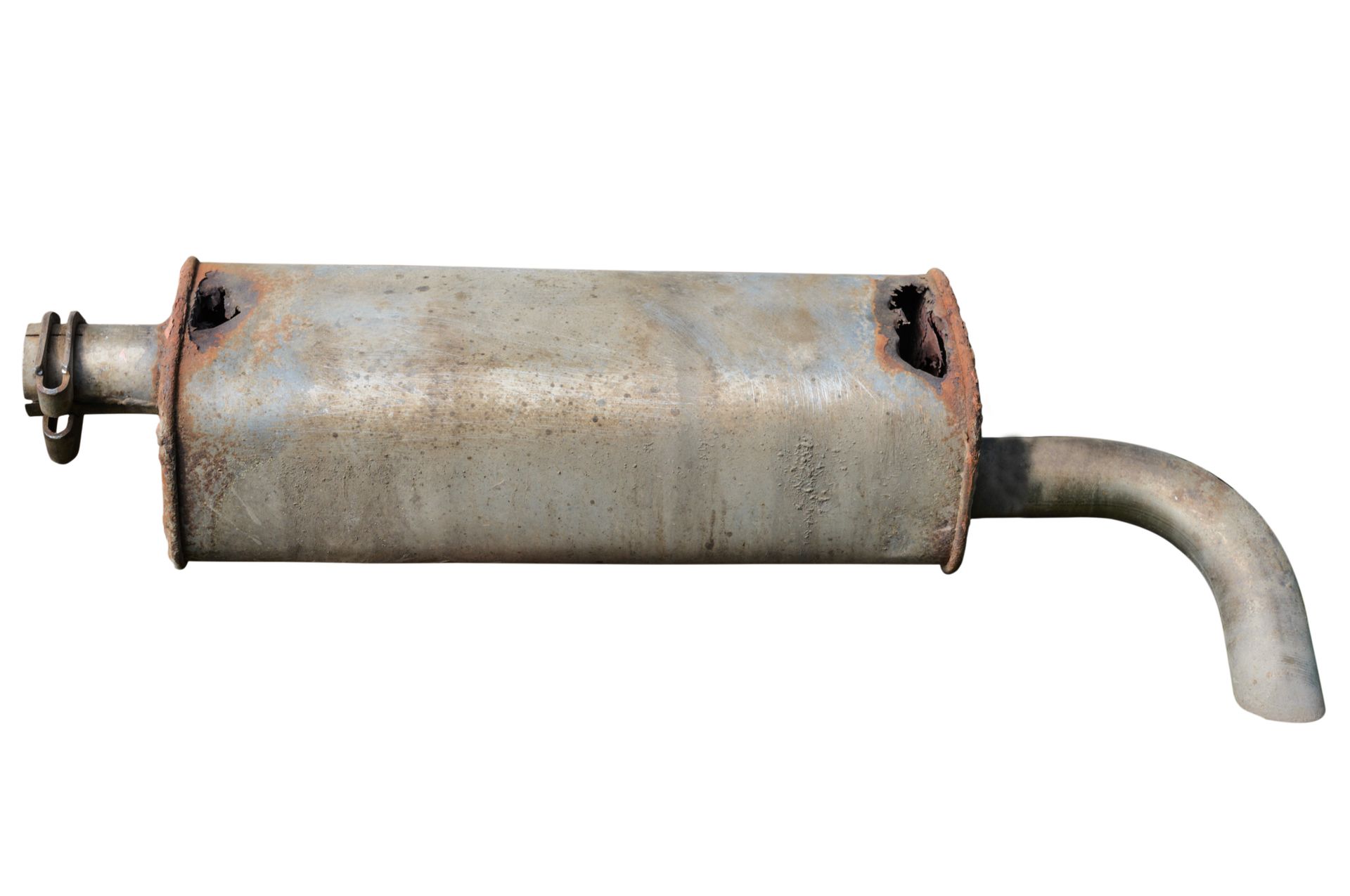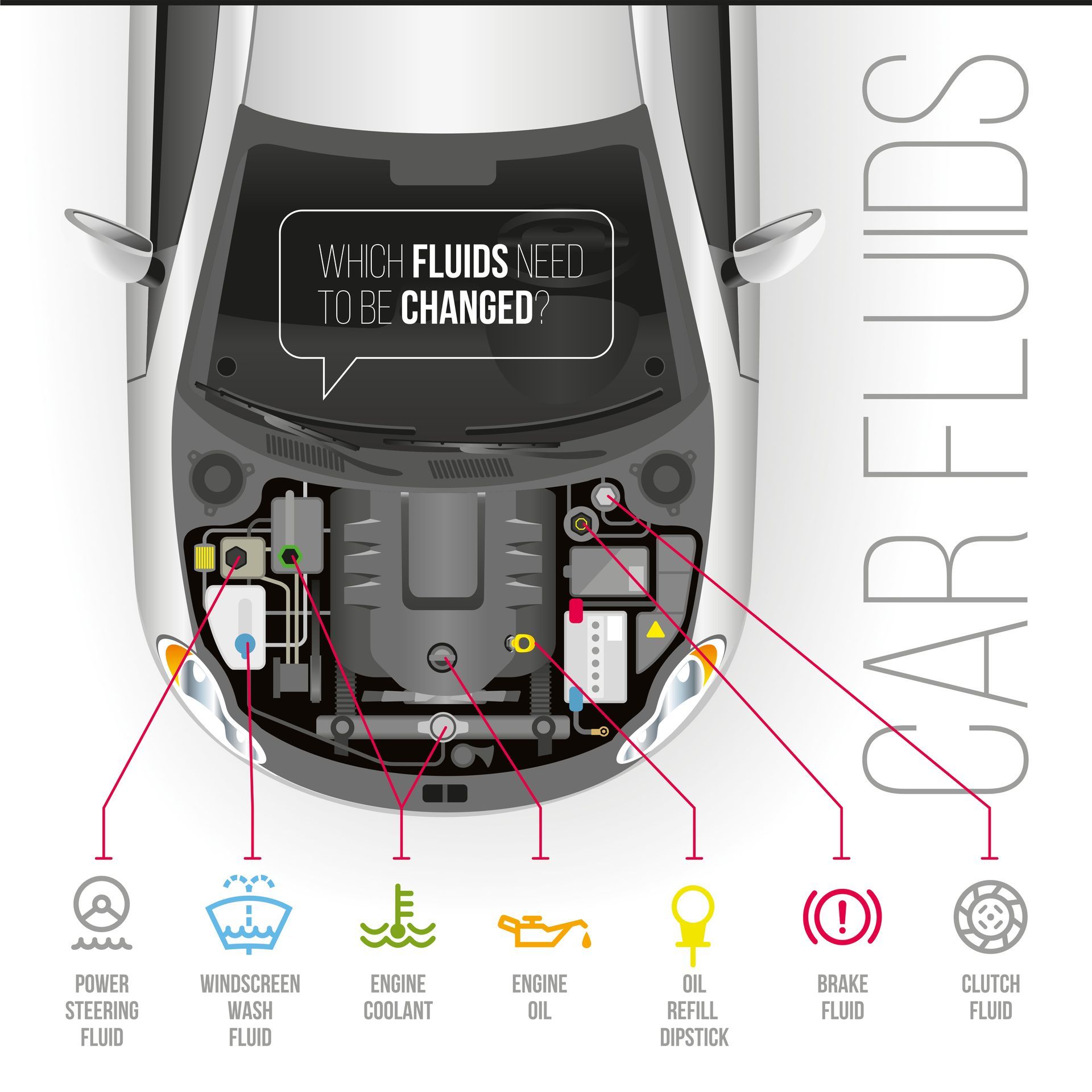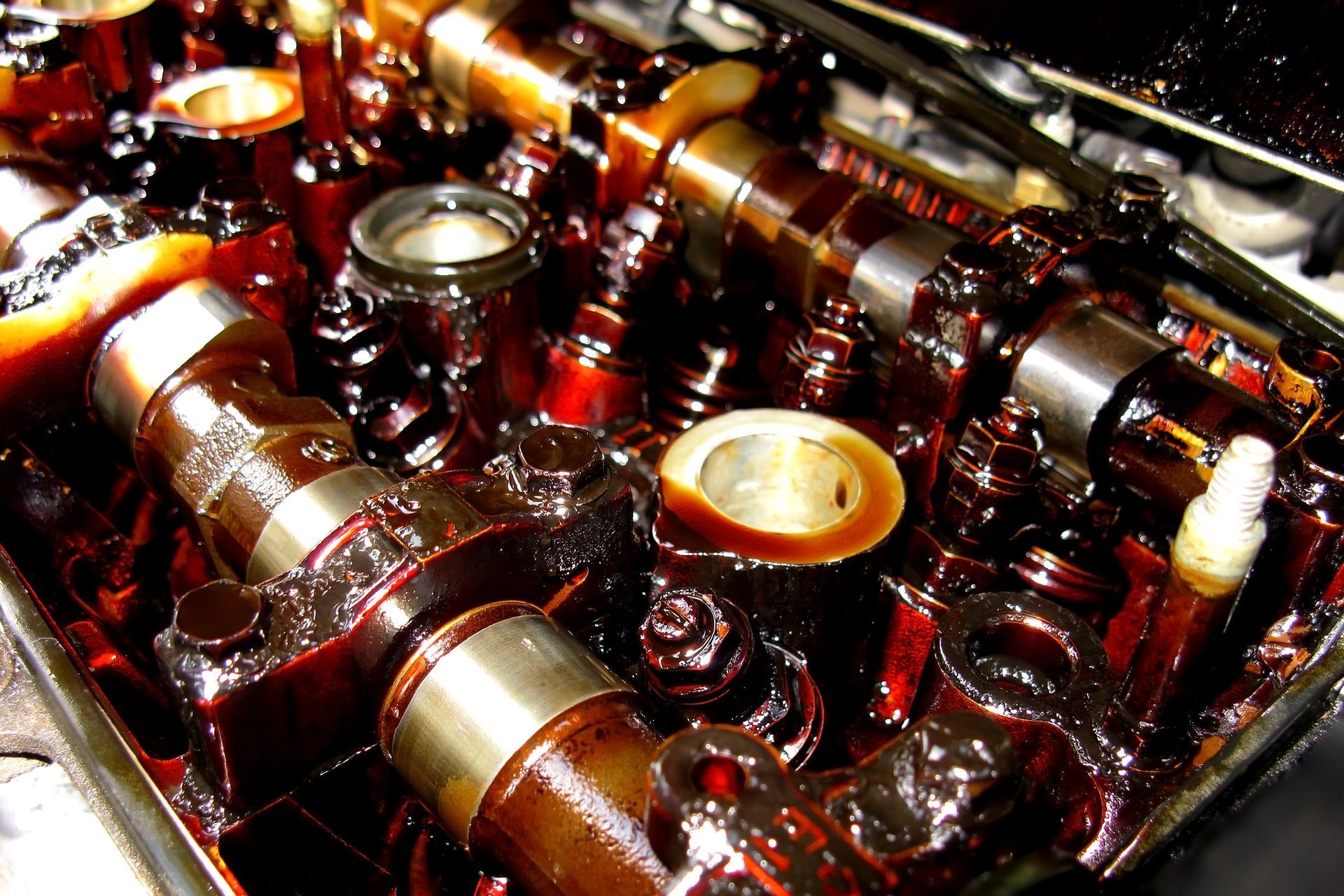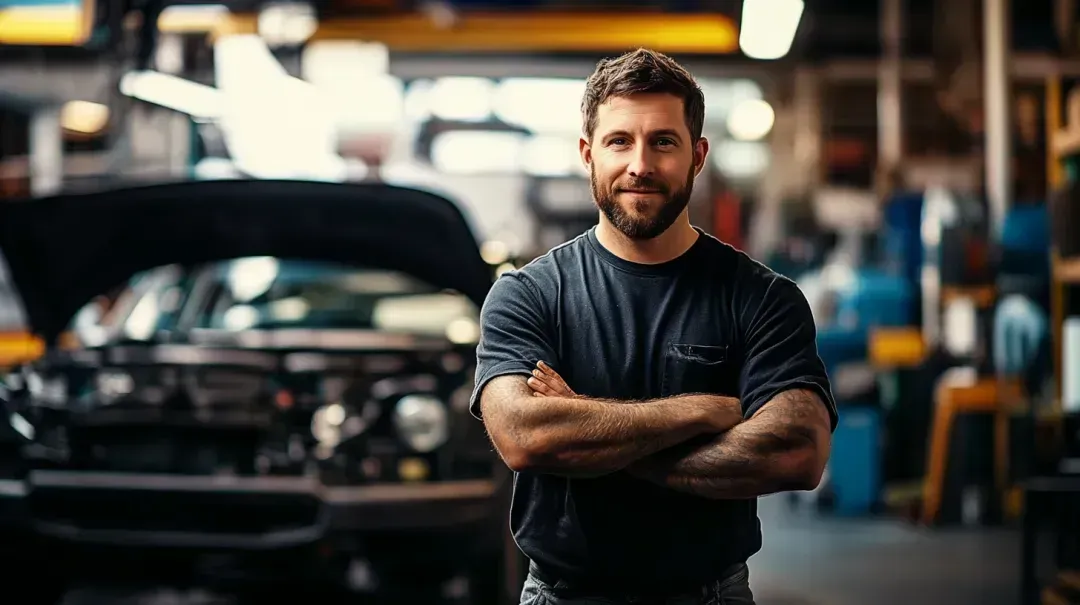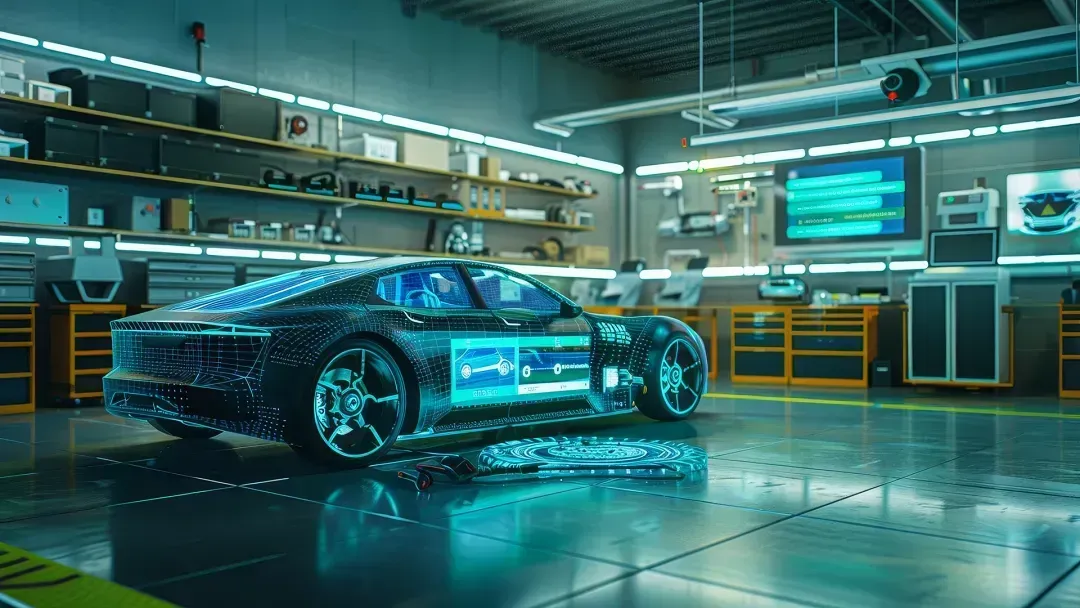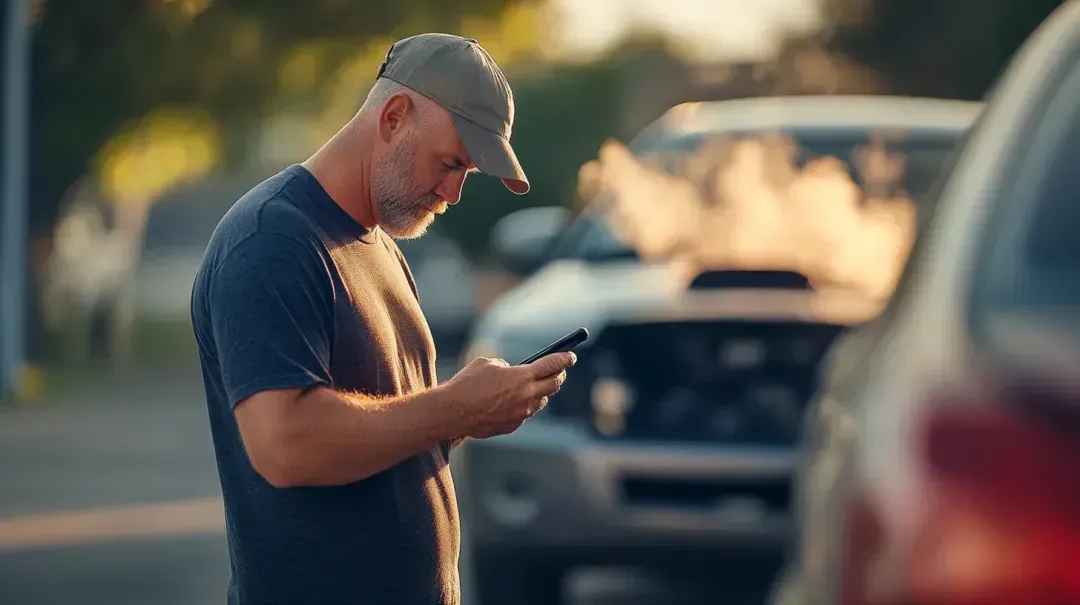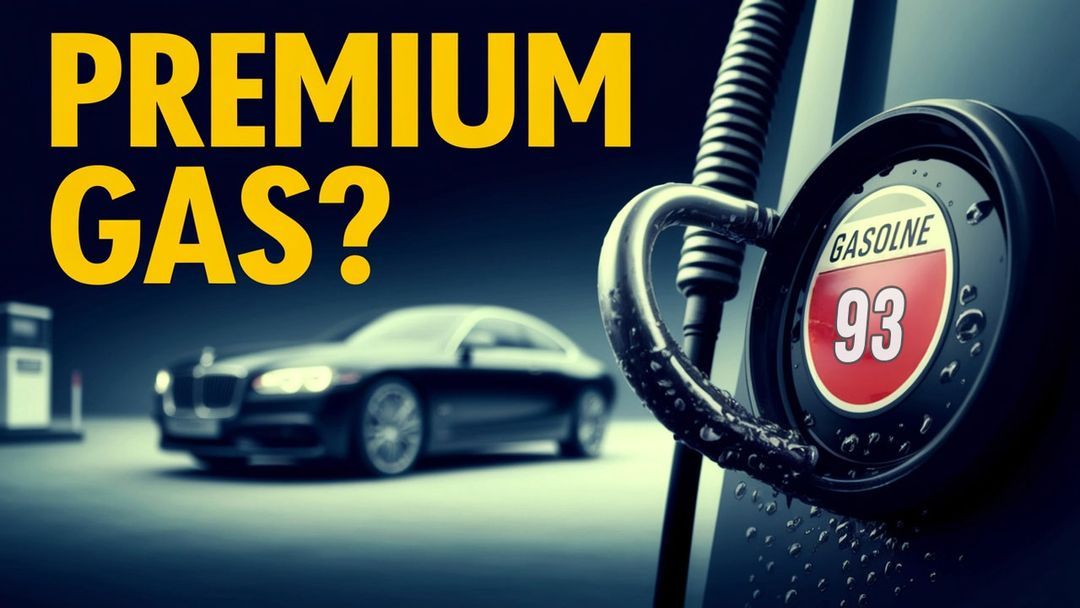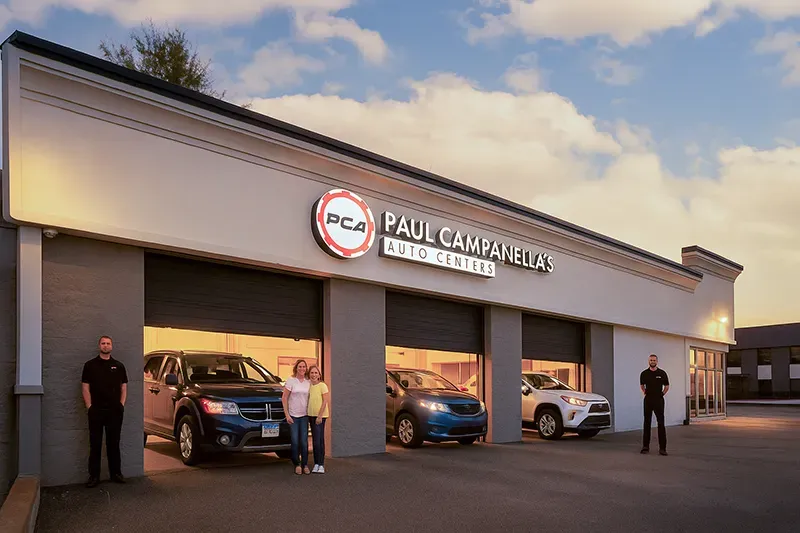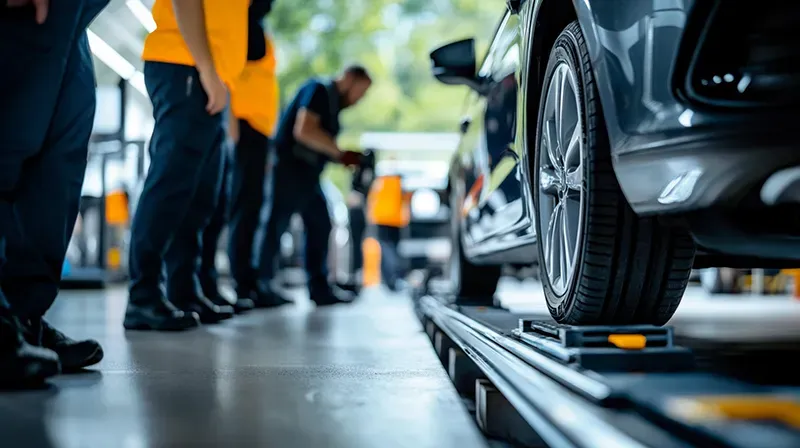Tips to Prevent Vehicle Damage in a Car Wash & What to do if Damage Happens
Americans love their cars. We love buying them, owning them, and driving them. Some people even love caring for them. When a vehicle is clean, people experience real emotional benefits. Seeing a well-maintained car shining in the sun is a satisfying feeling that anyone can appreciate. However, walking up to a dirty or dusty vehicle can be disheartening. No wonder keeping cars and trucks clean is a national obsession.
Keeping your ride clean and looking good also makes financial sense. Cleaner, shinier cars and trucks consistently fetch higher resale prices when it's time to sell. In fact, with all other things being equal, a vehicle with faded paint and an unkempt appearance bring 10-20 percent less than the same car that's been well maintained. That percentage can translate into thousands of dollars.
For most people in America, the purchase of cars, trucks, or SUVs will be one of the most expensive investments they make in their lifetime. For these people, the amount they spend on their vehicles is second only to the cost of a home or a college education. Whether it's a sensible used car or a top-of-the-line sports car, purchasing an automotive is a significant investment. With so much cash tied up in vehicle ownership, it's no wonder that so many car owners want to keep their ride sparkly clean.
Keeping your car or truck clean is an essential part of vehicle maintenance. Most vehicle have at least two layers of protective finish over the metal frame; the clear coat and the paint coat. Both coats can make your car look great, but they are also there to protect the integrity of the metal frame and components. Late-model car finishes applied at the factory include a top-coating, or clear coat, that is very durable. With care, that clear coat should last for at least ten years.
How often should you wash your car or truck? There is no one answer. Vehicles that are parked outdoors and under sap trees need to be cleaned more frequently. Automobiles that are operated near coastlines, exposed to bird droppings, near agricultural or industrial areas, or driven on road salt need more frequent cleanings.
A meticulously cleaned car not only looks great, but it also lasts longer. If the vehicle's clear coat is damaged, the paint layer can still protect the metal, but cracks and scratches in the clear coat allow water to penetrate to the paint layer, resulting in damage over time. Additionally, scratches, nicks, or damage to the clear coat may make it easier to sustain damage on the paint coat, which increases the risk of rust or deterioration to the frame and metal parts.
That's because dirt, dust, salt, grime, tree sap, and even bird droppings can scratch or damage the car's clear coat and paint job, eventually allowing water to creep under the surface. Seeping water can cause the finish to move, crackle, or even bubble. Ultimately, these protective surfaces become compromised enough to allow water directly onto the metal frame and to make contact with other metal parts. Not only does the water touch the frame, but the loose or bubbling clear coat (or paint coat) can actually trap the water next to the structure resulting in rust. To make matters more alarming, substances like salt and the acid from bird droppings can also work their way under the surface, get trapped under the protective finish, and cause more damage to the frame and metal.
However, while maintaining a showroom level of clean is the dream, washing and shining a car isn't always fast or easy. Hand washing at home simply isn't practical for many drivers. As a result, many people depend on the local automatic car wash to keep their automotive clean, sometimes taking their car or truck through the car wash weekly. While it seems that cleaning our vehicle should be one of the safest things we do with our automobiles, that's not always the case.
Drive-through or automatic car washes often rely on floppy brushes. If these floppy brushes are not meticulously clean, they can hold dirt, and drag that grit across your car or truck as they clean. While it may seem like a DIY cleaning bay is a safe bet, they also present hazards. The cleaning wands used in these facilities often require the use of brushes that also collect the kind of particles and debris that can scratch a vehicle's finish.
In fact, automatic car washes and cleaning bays are one of the most common culprits of minor damage on a car or truck's clear coat or paintwork. While many automatic car washes are clean and safe, even minor issues at these kinds of facilities can result in scratches and abrasions in your vehicle's finishes. For example, if the brushes at a car wash are not correctly maintained, your car is getting slapped with cloth strips that can inflict the same kind of damage as a vast, dirty mop. Dirt, grime, and particles in brushes can create hundreds of deep micro-scratches called swirl marks. If this happens enough, the damage increases and builds up. Over time, a car or truck's paint will become dull. Eventually, the scratches build-up and will become easy to spot, even at a distance.
According to Richard Reiner, product training director at CARiD.com , on carwash.com, common causes of micro scratches and swirling include:
“Failing to rinse off loose dirt before washing, Using a washcloth or sponge that is too abrasive, Using a harsh detergent or soap not designed for automobile finishes, Not washing with the “two-bucket” method (explained later in this article), “Dry dusting” a dirty car, and Waxing before properly cleaning or prepping a surface with a clay bar or polishing compound. In addition to rinsing off loose dirt from the car, carwash operators and detailing professionals must also take meticulous care of their equipment and wash materials. Even one miniscule piece of grit or sand on a brush or towel can create a minor surface abrasion on the vehicle.”
Once drivers learn about the potential downside of automatic car washes, they debate whether the speed and convenience of a car wash are worth the risks. Some vehicle owners try to avoid the possible damage from brushes by frequenting a touch-free automatic car wash. Touch-free car washes use a moving arm, power sprays, and a combination of cleansers to clean vehicles.
However, even touch-free car washes can damage a vehicle's clear coat and paint coat. Not only do these touch-free washes use aggressive acids to clean. Over time, overly acidic cleansers can deteriorate your car's protective coatings.
Brushless car washes also utilize high-pressure hoses. While these cleaning tools may seem to work effectively, high-pressure hoses don't always remove dirt thoroughly, especially stubborn substances like sticky grime, tree sap, bug splats, and bird droppings. And some of the grime remains. Additionally, cars with any abrasions or slight damages to clear coats or paint coats may find that high-pressure washes accelerate that damage.
So, if automatic car washes, self-cleaning bays, and brushless car washes can cause damage, does that mean that all car washes are bad? Not necessarily. Grime and dirt are real hazards to your car's finish and should be removed regularly. Automatic and drive-thru car washes do save time and hassle, which can translate into cleaner vehicles. Additionally, while some people think hand-washing is a better option, many home cleaning jobs are done on sunny days in direct sunlight. The combination of soapy water and the heat of the sun can soften the paint and lead to water spots.
When it comes to evaluating whether to use car wash or a wash your vehicle at home, it's helpful to look at the science. The University of Texas (UT) did research designed to determine the effect of home washing vehicles on the vehicle's finish. The UT study showed that a single home wash is rarely the best way to avoid scratches. In fact, the home car washes studies produced millions of tiny scratches, sometimes as deep at 10 percent of the car's paint total thickness.
DIY home car washers can also use the wrong type of soap. The wrong cleanser will remove the protective wax and leaves a chalky residue behind which can eat at the finish. And a dirty rag at home is just as damaging as a dirty brush in a car wash.
Remember These Tips to Avoid Damages When Using Automatic Car Washes
Automatic car washes are convenient and often safe. Smart vehicle owners know that there are many benefits to cleaning cars regularly. However, running your vehicle through a car wash (or a home wash) can cause real damage to the finish of your ride, not to mention the occasional damages drivers get from car washes in the forms of dings, dents, broken mirrors, or damaged windshield wipers.
In some cases, drivers can spot warning signs at a car wash that indicate an increased chance of damage. Here's a list of things to look for and avoid when choosing car washes. If you find yourself in these situations, leave the car wash, and find another way to clean your vehicle. Whether you wash your car once a day or once a month, remember these tips to help you reduce damage from car washes.
Tip: Avoid Car Washes That use Abrasive Brushes
Not all automatic car washes work the same way, and some pose a greater risk to your vehicle's finish than others. Automatic car washes that use abrasive brushes (instead of cloth) are not great for your vehicle and should be avoided. Facilities that use abrasive brushes made from nylon or plastics are most likely to leave small scratches on a car's finish.
Car washes with cloth brushes are a better choice, but if that car wash's brushes are dirty, they may also scratch the finish. If you see that the cloth brushes are dirty or blackened, turn around and try another location. If you're inside the car wash before you spot dirty brushes, remember to find a different car wash.
Touchless car washes use high-pressure water jets and cleansers without ever touching the car with a brush or cloth. Some brushless systems reduce the chances of cosmetic damage, while others use strong detergents than can increase the probability of damage to finishes over time. As a rule, use this type of car wash infrequently unless you know precisely what kind of cleaners are being used.
Tip: Avoid A Car Wash if the Vehicle Ahead of You is Especially Dirty
If the vehicle in front of you is heavily caked with mud or road salt, leave the car wash and return another time. No matter how good the car wash is, it takes a few cycles of rinsing to eliminate dirt, grit, and salt from both brush and brushless car washes.
Cars or trucks that have a heavy dirt build-up, lots of salt, or mud should start by eliminating heavy dirt in cleaning bays and at self-service coin-operated hand washes. If your car or truck is especially dirty, make this your first stop. Rinsing off heavy dirt using water, without soap or scrubbing, reduces the chance of scratching it into the surface in an automatic car wash. Removing heavy dirt before going into a car wash is also the right thing to do in consideration of others.
Tip: If the Car Wash is Dirty or Poorly Maintained, Avoid it
If you haven't visited the car wash before, evaluate the facility. Clean, modern grounds and facilities on the outside are a good sign that the inside is also clean and well cared for. Neat staff members who walk around with clean clothes are another good sign.
If the car wash's brushes are visibly darkened or grimy, they have dirt on them. This means that the soil will touch your car during the wash and may scratch it. Avoid car washes with blackened cloth or nylon brushes.
Look at the floor of the car wash. If you're going through a brushless system, the mud and grit can remain on the ground for the next few cycles, which means it's more likely to be sprayed back up on your vehicle. If you see clumps of mud or a lot of grit on the floor, leave the line and come back later or visit a different car wash.
Tip: Be Gentle When Wiping Down After the Car Wash
After using an automatic car wash, many facilities use blasts of heated air to move excess water off the vehicle. This is usually safe, and an effective way to dry your vehicle without causing damage.
Some full-service car washes also wipe down vehicles after they exit the car wash bay. As long as the attendants are using very clean, soft towels, this should not hurt your vehicle. However, on busy days, you may see that some attendants don't change out cloths frequently. If you see employees using a dirty cloth to wipe your car or other vehicles, skip the wipe down service to protect your car's coat. Once you get a vehicle off the car wash property, letting the car dry using airflow from the drive is the best guarantee of a no-damage experience. If you also want a spot-free clean or to remove water spots, pull over and wipe your vehicle down with a clean, soft, damp cloth. Or keep an auto cleaner on hand that is specially designed to remove water spots.
Whenever cleaning your vehicle at home or on the road, stick to cleaning products specially formulated for use on autos. Household cleaners or all-purpose cleaners can contain substances that may damage your car or truck's clear or paint coats and finish.
Tip: Don't Forget the Tires and Undercarriage
"Rustproofing" the undercarriage of your vehicle as a part of your car wash may not be a good investment since most are already well protected from rust. However, spending extra time or money cleaning the undercarriage may still be a smart move, especially for drivers who have accumulated mud or grit, live near the shore, or have exposed their vehicle to road salt.
Paying a little extra to clean tires and hubcaps may also be a smart idea. Because professional car washes use commercial-grade, heavy-duty cleaners, this can be an efficient way of removing the extra dirt, grime, and baked-on brake dust that accumulates on hubcaps and tires. Vehicles with aluminum alloy wheels should take special care to keep tires clean since brake dust can permanently stain these types of wheels over time.
Tip: Inspect Your Vehicle Before you Enter a Car Wash and After you Leave
While vehicle owners have seen the disclaimer posted at many car washes that the business is "not responsible for any damages that may occur" when using the car wash facilities, don't let this stop you from complaining about damage. Sometimes the damage inflicted is more significant that micro-scratches. In fact, nicks, dents, or dings often happen when the equipment malfunctions or the staff is careless.
If you find that your vehicle has been damaged during a car wash, there are many things you can do. First off, don’t drive off the lot and plan to address the issue later. Once you leave the car wash property, it will be much harder to prove the damage occurred at the car wash. Additionally, if you inspect your automobile before and after a car wash, you will be able to confidently identify any damage.
If you see damage, condition issues, significant scratches, dents, dings, a broken mirror, a damaged wiper, or a bent antenna, ask to see the manager. Show them the damage. Some managers may offer to fix the problem as a part of their customer service policy.
Even if the car wash does not offer to remedy the problem, ask to fill out an incident/damage report form, and keep a copy (or a photo of the document) for your records. If the car wash does not offer a complaint form, write a complaint on your own while on the premises, and take a photo of it so you can keep a copy for your records. These steps will help if you decide to pursue the matter with corporate offices, or if you need to file an insurance claim. If all else fails, take a photo of the vehicle at the car wash and get the name of the employee you spoke with. Note the date and time.
Some car washes may require customers to sign disclaimers relieving the car wash owners of any liability for damage. Others post signs that state they are not responsible for damages. However, state and federal consumer protection laws state that all business owners have a legal responsibility to provide reasonable care and keep their property safe. For owners of car washes, reasonable care includes regularly repairing and updating the car wash equipment, and adequately training employees. Any business owner that fails to keep their property safe for customers (and their vehicles) can be charged with negligence. If a customer can prove that it was negligence that led to vehicle damage, they may have a case for premises liability.
Additionally, some car washes offer additional services such as detailing and interior cleaning. Car wash employees or attendants usually do these services. Business owners are legally responsible for hiring employees with adequate experience and for training those employees to do their jobs properly. This means that if a vehicle suffers damage at the hands of a negligent employee, the customer may be able to hold the business owner responsible.
Even if a customer signs a waiver absolving the car wash of any damages, vehicle owners may be able to get compensation for damages if they can prove that the car wash owner or employees were negligent. The counsel and advice of lawyers and auto insurance companies can help vehicle owners determine if they have a legal case for seeking compensation. Talk to your insurance company or consider hiring an attorney to explore your legal options.
What to Do to Repair Car Wash Damage
What should you do if you see wear, scratches, swirl marks, or nicks on your vehicle after a car wash? Regardless of who picks up the tab, there are many things you can do to repair the damage and to prevent issues in the future.
If you own an older car or truck that uses a single stage paint, you won't have to worry about repairing clear coat above the paint coat. In these cases, many types of light scratches can be buffed out quickly and effectively.
If your vehicle has a clear coat, the thin, transparent layer on top of the underlying color coat, repairing the coat and restoring the shine usually involves repainting the damaged area.
How do you know which kind of finish is on your car or truck? Many automobiles, including almost all vehicles manufactured after the '80s, use the paint coat/clear coat system. While many cars before the 1980s also used this system, a significant number used single stage paint.
Whether your car is new, older, or vintage, it's important to know if your car or truck uses a clear coat, since it will affect approaches to both maintenance and repair. Your auto experts at Paul Campanella's Automotive can do simple tests to determine how any car was finished or painted.
Car Detailing
Car detailing is not technically a repair service, but it can be an effective way to keep your ride clean and to protect the finish from additional abrasions. Detailing usually involves cleaning and polishing all parts of a car from top to bottom. The experts at Paul Campanella's use specialty tools and commercial cleaning products that are not typically used in routine car cleaning. A professional car detailing at a qualified auto shop like Paul Campanella's may include minor clear coat corrections or elimination of minor discoloration spots.
Car Polishing
When car owners talk about polishing a car, they often use it as a catchall term that means anything that's done to improve the look of a car's paint job, including car wax. However, among professional auto mechanics, car polishing is the professional process of erasing, eliminating, buffing out, or covering up sub-surface defects.
According to Jeff Youngs on J.D.Power.com ,
“Whether you’re looking to increase the value of your vehicle in the eyes of prospective buyers or simply want your ride to shine, getting your car thoroughly cleaned, or detailed, has many benefits. Beyond the economic and aesthetic benefits, however, detailing your car on a regular basis can also help to extend its life by removing corrosive materials from the body and mechanicals.”
Unlike car wax, car polishes use a series of chemical processes to remove or dislodge particles in the paint. Car polishing can also remove paint that has been oxidized, and smooth out superficial swirl marks and surface scratches. A professional car polish is also a way to keep the clear coat and paint coat intact and looking better, longer. In some cases, car polishing is a part of car detailing. Ask your qualified auto technician at Paul Campanella's for details.
Paint Correction
If your finish has significant scratching or swirl marks, you may need to invest in paint correction. Also called swirl marks removal or machine polishing, this process reduces or removes surface scratches in the clear coat to restore the shiny, smooth finish. In paint correction, a qualified mechanic applies different grades of cleaner or polish using a rotary machine polisher. If done incorrectly, paint correction can actually burn the paint, or create an uneven finish. The margin of error is slight. But when done properly, paint correction can often eliminate surface damage to the clear coat, including exterior scratches, swirl marks, fading, and surface discoloration. It will also restore the finish and rebuild the clear coat so it can protect the surface of the vehicle from future fades and scratches.
Paintless Dent Removal (PDR)
If you've discovered a small dent in your vehicle after a car wash, it may be easy to ignore. But over time, even minor dents can lead to more expensive paint damage down the road. As long as the finish is intact, a qualified technician can use special tools to gently push or suction dents out without damaging the clear coat or paint coat.
Auto Body Painting
When scratches, chips, dents, or flakes become too extensive to patch, it may be time for a new paint job. An overall paint job will not only eliminate nicks, chips, and flakes; it will also protect your vehicle from rust and corrosion (and look great.) Paint jobs are good choices for vehicles marred by chips, nicks, scratches, paint swirls, or even rust.
In an overall auto body paint job, the vehicle's surface is sanded down to the bare metal and thoroughly cleaned. The qualified auto technician then applies a corrosion-resistant primer and gives it time to dry, or cure. The cured primer is then sanded, smoothed, and carefully cleaned to remove even tiny dust particles. The technician then applies paint, often in several layers or stages. The paint usually dries for several days in a dust-free environment. They then apply a shiny clear coat that not only gives the vehicle a glossy appearance; it also protects the paint coat. Once all the paints and clear coats are dry, the exterior is given a final buffing and polishing.
Mirror Repairs and Replacements
Mirrors are essential for safe driving, so it's important to keep them securely mounted and working correctly. However, car washes sometimes damage mirrors. Mirrors that are specially mounted are at greater risk for damage.
Sometimes the mirror fixture or arm is knocked loose. Other times the glass in the mirror is damaged or removed. Whenever your mirror or mirror mount is damaged in a car wash, Paul Campanella's can repair or replace mirrors and mirror glass. The cost of fixing or replacing a mirror will vary depending on the vehicle's manufacturer and model. While it usually doesn't take long to replace the mirror itself, some vehicles will require that part of the door be taken apart to install the mirror.
Is Your Vehicle Damaged in a Car Wash? Get it Fixed Soon!
While small dings, scratches, or damage from a car wash may be easy to ignore, it's not smart to postpone repairs. Any damage to your vehicle’s clear coat or base coat may allow water to seep under the finish, which can result in rust. Small issues can morph into more significant problems quickly.
Ready to take care of your vehicle's scratches and dings? If you're in the New Castle County area, talk to our qualified auto technicians at Paul Campanella's Tire and Auto Center at 1015 on West 28 th Street in Wilmington, or Paul Campanella's Pike Creek Automotive at 2379 Limestone Road in Wilmington. Not only can we help you protect your car or truck, but we can also make it look beautiful again.

